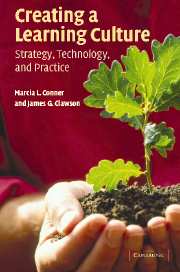Book contents
- Frontmatter
- Contents
- Contributors
- Foreword by Douglas K. Smith
- Introduction
- Part I Perspectives on a changing world
- Part II Adaptive approaches to organizational design
- 7 Innovative cultures and adaptive organizations
- 8 A relational view of learning: how who you know affects what you know
- 9 Improved performance: that's our diploma
- 10 The real and appropriate role of technology to create a learning culture
- 11 The agility factor
- 12 Tools and methods to support learning networks
- Part III Expanding individual responsibility
- Index
8 - A relational view of learning: how who you know affects what you know
Published online by Cambridge University Press: 05 June 2012
- Frontmatter
- Contents
- Contributors
- Foreword by Douglas K. Smith
- Introduction
- Part I Perspectives on a changing world
- Part II Adaptive approaches to organizational design
- 7 Innovative cultures and adaptive organizations
- 8 A relational view of learning: how who you know affects what you know
- 9 Improved performance: that's our diploma
- 10 The real and appropriate role of technology to create a learning culture
- 11 The agility factor
- 12 Tools and methods to support learning networks
- Part III Expanding individual responsibility
- Index
Summary
Think about how you are likely to get information that helps you learn and be successful in new or existing projects at work. Are you more likely to (A) Type in a few words on a search engine and get what you need or (B) Seek out people who have done something similar, either learning from them or going on to people or to documents they suggest? If you fall into category A, information that matters to you is readily attainable through technical means. If you fall into category B, you might end up getting information from a database, but the way in which you find the information and deem it credible is heavily intertwined with your social network. By a show of hands, who would typically follow path A? How about B?
We have posed this question in more than fifty presentations over the past four years to executives from a wide range of industries, government agencies, and nationalities. In our interactions with thousands of people, we have yet to see more than a lonely hand or two pop up in response to option A. Despite the explosion of information, and the increasingly sophisticated technologies that provide us with easy access to this information, it seems that even the most technical of us learn primarily from other people. This is not all that surprising. Our heavy reliance on other people for information and learning is one of the most consistent and robust findings in the social sciences.
- Type
- Chapter
- Information
- Creating a Learning CultureStrategy, Technology, and Practice, pp. 152 - 168Publisher: Cambridge University PressPrint publication year: 2004



